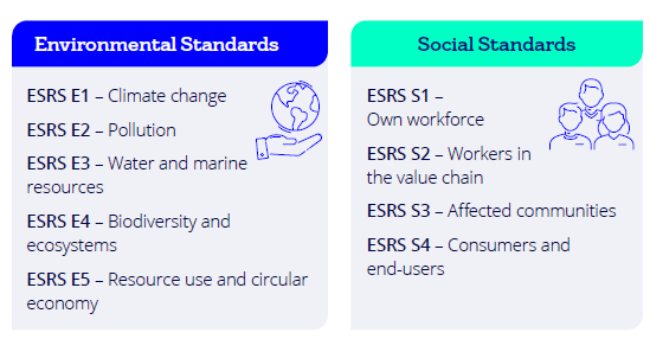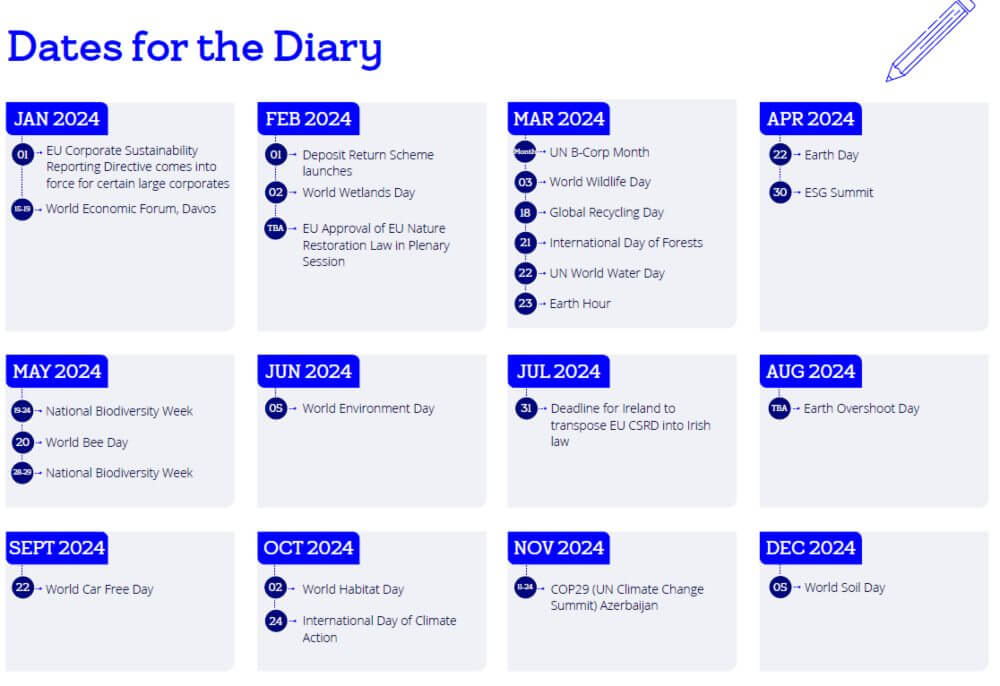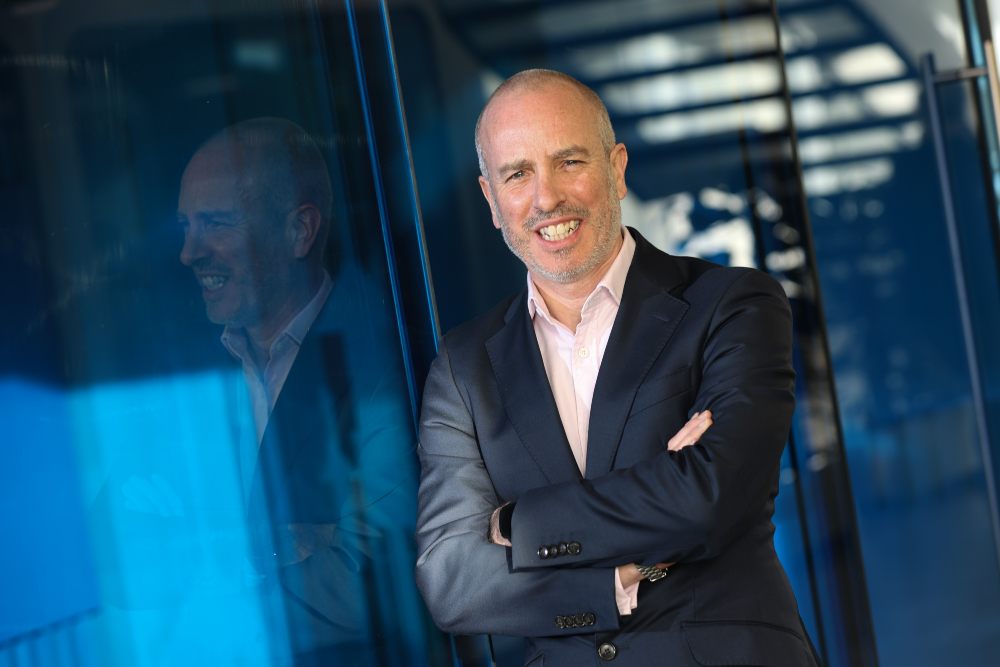Looking to 2024 the trends Bank of Ireland’s Sectors team expects to feature strongly and their views as to the implications for business.
Our hopes for 2024
“A recognition of the state of emergency and the urgency for all businesses to take action to protect their future income and the planet. 2023 was the hottest year on record and there is no doubt the implications will be far reaching. The time to act is now!”
- Susan Crawford, Head of Sustainability (susan.crawford@boi.com)
“Retailers have a vital role to play in educating consumers about the story behind their products; where they are sourced and their environmental footprint. Responsible retailing is here to stay and I hope Irish retailers embrace this opportunity proactively”
- Owen Clifford , Head of Retail (owen.clifford@boi.com)
“The business environment for nursing homes is challenging, I’d love to see more smaller nursing homes accessing the grants available from SEAI to invest in renewables and reduce running costs”
- Gráinne Henson, Head of Healthcare (grainne.henson@boi.com)
“Deployment of technical solutions innovations in the tracking of energy use and carbon emissions for businesses. Let’s make it easier for businesses to recognise their impacts”
- Paul Swift, Head of TMT (paul.swift@boi.com)
“Food waste is so important, creating 8-10% of all Green House Gas emissions globally. I would love to see a root and branch focus on this, with the full food chain looking at how we can work together to overcome this challenge”
- Lucy Ryan, Head of Food and Beverage (lucy.ryan@boi.com)
“Farmers will continue to aim for the highest standards of sustainability and my hope is that we can collaborate increasingly with the industry and farmers to achieve those standards as cost effectively as possible”
- Eoin Lowry, Head of Agriculture (eoin.lowry@boi.com)
“The sector is really ahead of the curve when it comes to using renewables to manage costs; I’d like to see manufacturing companies think more broadly about how to support climate action with a focus on the circular economy driving further innovation”
- Conor Magee, Head of Manufacturing (conor.magee@boi.com)
Corporate Sustainability Reporting Directive (CSRD)
The EU Green deal has shone a light on how we define sustainable activities (through the EU Taxonomy and the proposed European Green Claims Directive) and how we record and benchmark our progress (through the Corporate Sustainability Reporting Directive and upcoming Corporate Sustainability Due Diligence Directive) – enshrining in law the requirement to consider the entire value chain.
In complying with the Directive, businesses must consider five environmental standards and four social standards as well as two general standards and one for business conduct.
2024 is the first year of the new obligations for the CSRD and the European Sustainability Reporting Standards (ESRS) so we will see the first tranche of reports complying with the legislation in early 2025. Over the coming years, we will see some 50,000 businesses brought within the scope of this legislation.
Larger businesses will be familiar with the majority of the disclosures as most will have been reporting much of this information on a voluntary basis as part of corporate sustainability reports. The new challenge arises with the statutory nature of the disclosure, meaning that there is now comparability between businesses and a new level of accountability with the requirement for oversight from auditors. This creates a focus on the data quality, completeness, accuracy and paper trails that previously were the preserve of financial accounting.
Furthermore, disclosures must be based on “double materiality” i.e. an assessment of the relevant impacts and risks from two perspectives, firstly the business’ impacts on people and planet and secondly financially material ESG impacts on the business. Both positive and negative as well as actual and potential impacts are to be considered, guiding businesses to a comprehensive assessment of how the business interacts with the world at large.
Whilst we eagerly await the first of these reports from the largest European companies and subsequent waterfall of reporting obligations to other businesses over the coming years, we must consider the downstream impacts and the need for increased data collection and management by smaller businesses within those supply chains.
CSRD impact on the SME community
“On the social side, SMEs will be particularly interested in the standards relating to disclosures under ‘Workers in the value chain’”
Our customers are keen to understand what the implications of CSRD disclosures will be for those smaller businesses contributing to supply chains for corporates. In examining the standards for disclosure, we see a number of key areas where supply chain partners might expect to see increasing engagement, including carbon accounting and employee rights and welfare.
Scope three emissions include, amongst other things, emissions arising in the supply chain and may comprise 90% or more of a corporate’s carbon footprint. Corporates must report scope three emissions, as well as the percentage of this that has been calculated using primary data, as opposed to modelled or estimated data. This requirement will naturally increase the focus on the total quantum of emissions in this category but, in time, it will also create an expectation of increased accuracy and primary data collection.
- SMEs looking to get ahead and prepare for customer demands can use a range of resources including the Climate Toolkit 4 Business | Zero Carbon Journey to start gathering the relevant data and making their own carbon footprint calculations.
On the social side, SMEs will be particularly interested in the standards relating to disclosures under “Workers in the value chain.”
These disclosures include assessments of the opportunities, risks and impacts of business activities on workers in the value chain, which will drive corporates to delve deeper into those value chains to get a full picture. The standards also specify disclosure of
- policies relating to workers in the value chain,
- the level and type of engagement with such workers (or representatives thereof) and
- the action being taken to either mitigate against negative impacts or deliver and enhance positive impacts.
This will mean that a hands-off approach to workers in the value chain will no longer be an option for those disclosing. SMEs in the value chain can expect that their corporate customers will need to reach out, not just for more information but to work increasingly collaboratively in the protection of their full workforce.
Renewable energy and innovation
Investment in renewable energy is now an important tool in managing business costs, and businesses are alive to this reality. Businesses of all sizes are looking to manage costs and reduce their carbon footprint by adopting a “lean, mean and green” approach to energy. In other words, they are putting in place a three-step investment and management strategy:
- Reducing the overall energy demand for example by investing in high quality machinery as well as increased insulation and airtightness in buildings;
- Undertaking energy audits and managing ongoing energy use to ensure there is no unnecessary energy usage, and
- Moving to renewable energy sources, for example photovoltaic (PV) solar panels
This trend has been rising for some time but with climate change impacts hitting home and the recent years’ volatility in energy prices, not to mention the generous Government grants for investment, we expect this trend to accelerate in 2024.
The Governments Micro-generation Support Scheme (MSS) is expected to support 380MW of new micro-generation capacity by 2030, with 60,000 homes and 9,000 non-domestics (e.g. farms, businesses, schools etc) set to benefit, for renewable installations up to 50kW. The Clean Export Guarantee (CEG) tariff allows customers to benefit from payments from their electricity supplier for all excess renewable electricity they export to the grid, which assists with the investment payback.
There are grants available from the SEAI to support this investment – see their website for details.
A key part of Bank of Ireland’s sustainability strategy is to help support the transition to green. Your local Bank of Ireland Business Manager will be very happy to discuss funding supports that may be available to your business.
While wind and solar represent the most tried, proven and affordable solutions at the moment to reduce carbon emissions, further innovations in other clean energy solutions such as hydrogen, geothermal, and carbon capture will likely be required to speed up the transition to net zero.
Improvements in energy storage, and supply demand balancing solutions will also be needed to ensure energy generated is efficiently managed.
Nature and biodiversity
The corporate focus on nature (biodiversity) which has taken off in recent years will continue to escalate throughout 2024. With over half of global GDP dependent upon nature* and a continuous stream of reports highlighting the decline of biodiversity across the planet little wonder that companies are reviewing their impacts on nature across supply chains.
Legislation – both national and international – is establishing obligations to quantify and report these impacts and this trend is set to continue in 2024.
From an Irish perspective the imminent publication of the Fourth National Biodiversity Action Plan will be instructive:
- it will deliver a detailed analysis of the current state of nature in Ireland, setting out recommendations that will inevitably contain proposals for obligations on business to play their part in the repair and restoration of biodiversity.
- 2024 should also see further clarity from the EU on the Nature Restoration Law which was agreed last autumn. This legislation will primarily have an impact on the Irish agricultural sector but also have implications for businesses as a whole.
“2024 will also see the continued roll-out of the provisions of TNFD which was formally launched late last year”
2024 will also see the continued roll-out of the provisions of TNFD (Taskforce on Nature- related Financial Disclosures) which was formally launched late last year. The TNFD is an international initiative designed to provide a framework for how organizations can address environmental risks and opportunities and is aligned with the new EU Corporate Disclosures regime. It is expected that an increasing number of companies will adopt this agenda which encourages a shift away from processes and practices which compromise biodiversity.
Increasing adoption of the TNFD reflects a growing acceptance amongst businesses that climate change and nature are two sides of the same coin and, increasingly, nature-based solutions are being deployed as carbon mitigation measures that, at the same time, deliver a benefit for biodiversity. This theme will continue to grow in the year ahead.
The Just Transition
The journey to a Net Zero world will create new sources of wealth and income, whilst climate change will have uneven impacts across geographies and between economies. Concentrating on a just transition asks that we consider how to balance these factors, ensuring we don’t unfairly advantage richer countries or leave certain groups behind.
At Bank of Ireland, we are focused on the impacts on our customers; SME customers often lack the resources to plan their sustainability journeys and to invest in the changes that will be needed either to reduce environmental impacts or to manage costs associated with climate change. We are mindful of these gaps and in 2024 we will build on our progress in supporting SMEs by:
- Directing our customers to our Green Business Hub, a key resource that highlights a range of supports from Government grants to training and sustainability toolkits;
- Upskilling our own teams, particularly on the front lines, to ensure that we are equipped with the information and expertise to help customers;
- Engaging directly with our customers to offer our expertise in plotting their next steps on the sustainability journey.
CSRD has placed equal focus on the Social pillar within ESG and this in turn will mean that our customers are required to put the impact of their business activities on people at the forefront of all sustainability action.
- The Sectors Team is a differentiator for Bank of Ireland, in that the sector heads are recruited directly from industry and bring perspective that only first-hand experience can provide. To learn more about Bank of Ireland’s sectoral expertise, click here







